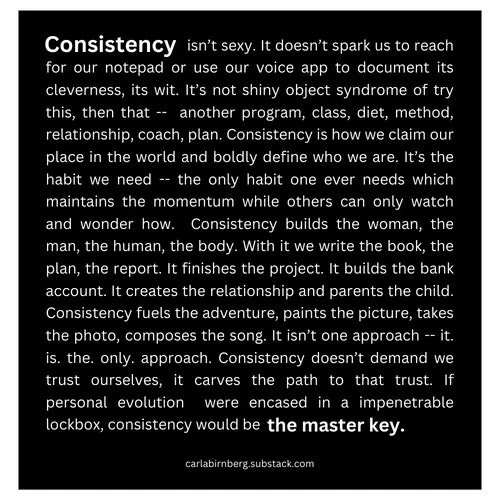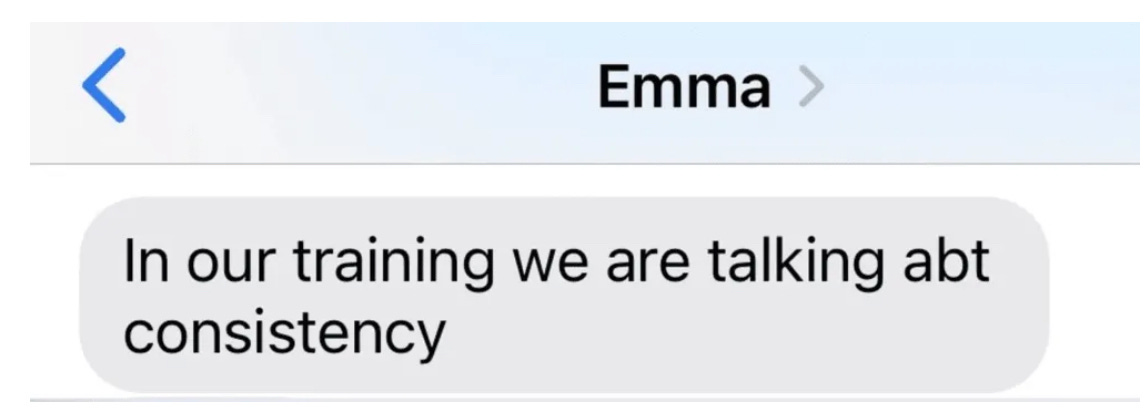Consistency parents the child.
Ahhhh young adulthood, where change is the only constant and parents find themselves navigating a number of new challenges.
It’s me.
I’m parents.
As these no longer tiny humans transition from adolescence to early-adulthood, our role dramatically shifts. I like to remind myself, especially when I look around and wonder how the heck to guide practically-adult her, one element remains the same: the need for consistency.
As we’ve established in previously episodes: for good or for bad I live a life guided by consistency. I always have.
Young adulthood, with its transitions of college life, career beginnings, financial independence etc, brings its own set of nerves (for them) and challenges (often for us).
Amidst *all* this change, I’ve been repeatedly reminded consistent parenting still serves as stability, providing her with an anchor and sense of ‘scaffolding’ as she ventures into the world.
Trust is built with consistency. - Lincoln Chafee
Four ways to consistently parent a young adult:
📌 Redefine boundaries: the art of consistent expectations
As young adults seek independence, the nature of parental boundaries evolves.
No longer focused on curfews or homework-prodding (yay), consistent parenting now involves clearly communicating expectations around growing responsibilities. This might include discussions about financial contributions, communication frequency from college/university, or household duties if yours, like mine, still lives at home.
Maintaining consistent boundaries helps facilitate mutual respect and, almost to my surprise, gives mine a sense of responsibility and contribution she really enjoys.
My approach is to encourage thoughtful decision-making without micromanaging. Here, as in the rest of life, consistency doesn't equate to inflexibility; rather, it's about providing a loose framework that adapts to HER growing maturity and evolving needs.
📌 Emotional anchor: consistent support in changing times
The most important aspect of consistent parenting during young adulthood is emotional steadfastness even though this is a strange new time for us as well.
The transition out of high-school and into ‘what’s next’ is stressful, and an opportunity for us to (get out of our own damn way and) provide the consistent emotional support they need and thrive from.
It can be hard for me to remember it's not about problem solving; it’s about being predictably present to listen, advise only when asked, and consistently (& calmly) encourage/reassure.
📌 Lead by Example: the power of consistent role modeling
It surprises me how influential we as parents *still* are in our Kidults’ lives.
Applying my notion of Practice dont Preach! with regards to consistent demonstration of healthy behaviors—stress management, work-life balance, fiscal responsibility, navigating relationships etc.—still works!
When our young adults observe us handling life's challenges with resilience and adaptability, they are more likely to do the same.
This also reinforces the idea personal growth and stability are achieved through consistent actions rather than panicked, impulsive reactions.
📌 Balancing Act: consistency with flexibility
Consistency in our habits and actions provides a framework that eliminates much of daily decision-making—freeing up mental energy for more important things.
Rather than being rigid and limiting, the stability that consistency provides creates space for exploration, innovation, and growth.
By adapting our approach to parental support (AKA backing off) while still maintaining reliability, we offer a foundation for development, enabling our Kidults to cultivate independence and decision-making skills while still benefiting from our guidance.
text from the Kidult at her new job training
Consistent Kidult parenting is as simple as being a steadfast presence in their rapidly changing world.
As they navigate the complexities of independence with childlike nervoucitement the awareness they have adults offering consistent support, clear boundaries and expectations provides a foundation of security and confidence.
This consistency gives them the materials needed to build a bridge between what was and what will be.
Or so we hope around here.
Now you.
Have you discovered the power of consistent parenting in general? With a young adult?
If you’re not a parent do you use this same approach with young adults you work with or mentor?






Love this!!